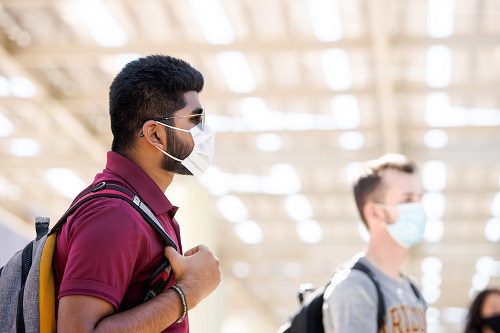How a student group switched gears to staff COVID-19 testing sites at ASU
Usually ASU’s student-run Arizona State University Student Emergency Medical Services organization staff on-campus events such as sports games and stay available to provide 911 emergency assistance if needed. As certified emergency medical technicians, they work with other first responders to respond to emergencies on campus. During the fall 2020 semester, SEMS members switched gears from staffing on-campus events to staffing on-campus COVID-19 testing sites.

A decrease of in-person events due to the pandemic and a need for staff at the campus COVID-19 testing sites ultimately led to the organization’s role in staffing the sites, said Christian Sulit, emergency medical technician student worker and 2019 ASU alum who studied business data analytics.
Although Sulit graduated in 2019, this year he enrolled in additional classes at ASU that allowed him to continue working for SEMS.
“Coming into [last school] year we weren't quite sure what to expect with the university's policies on keeping the campus open or how our jobs were going to be affected,” Sulit said.
Throughout the 2020–21 academic year, COVID-19 testing was available daily to Sun Devils on all campuses, large-scale efforts that offered testing to not only the ASU community but the larger community for both walk-up and drive-through appointments.
“We just decided it was best for ASU EMS to indefinitely just staff the COVID-19 testing sites,” Sulit said.
Students who helped staff the sites worked in three different positions. According to Sulit, the positions were referred to as triage, floater and collector.
“Everybody kind of plays different roles on a day-to-day basis but generally there are three main ones,” Sulit said.
The triage workers greeted students who came in to take the COVID-19 test. The workers made sure students were prepared for the test and had followed all the guidelines necessary.
“What we are doing is we’re making sure that every student has quick, easy-to-understand and fast turnover access to COVID-19 tests,” Sulit said.
The floaters were workers who walked around the testing site to ensure that everyone was taking the test properly. They helped students if they had any questions during the test as well.
“We sanitize everything, we are constantly cleaning,” said Shay Parker, a senior studying criminal justice and emergency medical technician student worker.
Everyone also wore full protective gear, Parker said.
The collectors were the workers who took the tests from Sun Devils when they were finished with the testing process. Collectors were in charge of checking to make sure the sample was valid and make certain that the sample was scanned and sent to the right place.
“All the procedures and things that we have set in place at the site are designed specifically to keep the people testing safe as well as the employees,” Parker said.
“And so by working the site and being able to do testing on such a mass scale we are able to serve more of the community and as a result kind of lessen the spread of the virus,” Parker said.
SEMS continues to work on COVID testing efforts. Currently Sun Devils can continue to get tested for COVID-19 through ASU’s COVID-19 testing drop-off stations located on all four ASU campuses. Sun Devils can also sign up to get vaccinated for COVID-19 through their MyASU Health Portal.
After reflecting on what it was like to work the COVID-19 testing sites both Parker and Sulit mentioned how important it is for health care workers to be able to adapt to any situation.
“Honestly if I have learned anything from it it's that health care workers really need to exercise flexibility,” Sulit said.
“Even though it's not maybe what I expected for the year, I'm still happy that I [was] able to serve the community in a new capacity,” Sulit said.
“I think that my role as a COVID-19 tester is really important because at its core our purpose is to help safeguard the health of the university,” Sulit said.
“When I became an EMT the reason for doing so was because I wanted to serve the community,” Parker said.
“Without people who are willing to work these sites, we wouldn’t be able to conduct testing on such a mass scale,” Parker said.
According to Sulit, all Sun Devils should try to get tested regularly.
“It's a good thing for everyone to get tested. The only way we can ensure that those metrics stay accurate is if we get as many tests coming in from as many students as possible,” Sulit said.
“It's incredible and us being able to deliver that service to everybody at the university is critical to maintaining the public health at the university,” Sulit said.